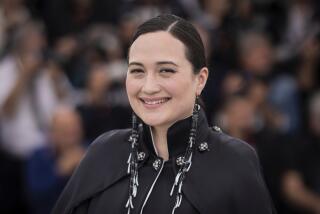Miyoshi Umeki, 78; Japanese singer and actress became first Asian to win Academy Award
Miyoshi Umeki, the Japanese-born singer and actress who became the first Asian performer to win an Academy Award, for her touching role as Red Buttons’ wife in the 1957 film “Sayonara,” has died. She was 78.
Umeki, who also was known for playing the housekeeper on the TV series “The Courtship of Eddie’s Father,” died of complications of cancer Aug. 28 at a nursing home in Licking, Mo., said her son, Michael Hood.
Umeki had been a singer and nightclub performer in postwar Japan, where she recorded popular American tunes for RCA Japan under the name Nancy Umeki, before moving to the United States in 1955 and signing with Mercury Records.
She was a regular on the musical-variety show “Arthur Godfrey and His Friends” before she was cast in the role of Katsumi, the young Japanese woman who becomes the bride of an American Air Force sergeant played by Buttons in the film version of James A. Michener’s best-selling novel of romance and racial prejudice in postwar Japan.
Umeki and Buttons won supporting actor Oscars for their roles as the doomed newlyweds.
Umeki also gained acclaim -- and a Tony Award nomination as best actress in a musical -- playing Mei Li in Rodgers & Hammerstein’s “Flower Drum Song,” which ran on Broadway from 1958 to 1960.
“When Miyoshi Umeki glides onstage to star in her first Broadway show, her first four words capture the house. The warmth of her art works a kind of tranquil magic, and the whole theater relaxes,” proclaimed a Time magazine writer in a cover story on Umeki and co-star Pat Suzuki. Umeki also re-created her role in the 1961 film version.
“She was a teeny, little girl with wonderful, wide eyes, and she expressed tremendous innocence and sweetness; she was just lovely,” Miles Kreuger, president of the Institute of the American Musical in Los Angeles, said in an interview Wednesday, assessing Umeki’s Broadway performance.
The youngest of nine children whose father owned a successful iron factory, Umeki was born May 8, 1929, in Otaru on the large Japanese island of Hokkaido.
Educated at a finishing school for girls, she developed an early love of music, taking harmonica, mandolin and piano lessons. She also sang incessantly, irritating her parents by singing American-style tunes she learned from records.
After the war ended, she traveled for a time with a U.S. Army jazz band in Japan and is said to have been the first Japanese vocalist to record American songs in her homeland.
During the 1950s and early 1960s, she was a guest performer on the Perry Como, Dinah Shore, Ed Sullivan and Andy Williams shows.
She had supporting roles in a handful of films, including “Cry for Happy,” “The Horizontal Lieutenant” and a “A Girl Named Tamiko.”
She also made a number of guest appearances on TV series such as “The Donna Reed Show,” “Dr. Kildare,” “Rawhide,” “Burke’s Law” and “The Virginian.”
And from 1969 to 1972, she played Mrs. Livingston, the dependable housekeeper, on “The Courtship of Eddie’s Father,” the sitcom starring Bill Bixby and Brandon Cruz.
Umeki retired from acting shortly after the series ended, her son said.
“She was quite proud of her accomplishments; she loved performing, loved what she did, but she simply wanted to retire,” he said.
“She was done with show business. She wanted to get out and just lead a nice, quiet family life.”
Umeki was married twice: to Win Opie, a television director, from 1958 to 1967; and to Randall Hood, a documentary producer and director, from 1968 until his death in 1976.
Through the early 1980s, she owned and operated a film-editing equipment rental service, which she and Hood had started a decade earlier.
A longtime resident of North Hollywood, she moved to Missouri nearly five years ago to be near her family.
In addition to her son, Umeki is survived by two grandchildren and extended family members in Japan.
More to Read
The biggest entertainment stories
Get our big stories about Hollywood, film, television, music, arts, culture and more right in your inbox as soon as they publish.
You may occasionally receive promotional content from the Los Angeles Times.










